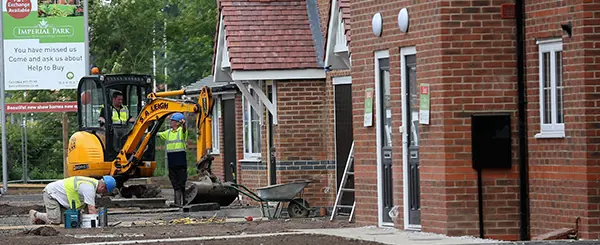The first Monday of a new year always allows the Government to announce policies with a bang. After the Christmas break, the media clamours for domestic news and this Government has duly obliged. The topic? Housing.
This week, the Government announced that it would directly commission smaller builders to build homes on public land which already has planning permission. These sites would include market homes and (up to 40%) starter homes (homes sold to first time buyers of under-40 years old at a discount of 20% on market value). Furthermore, in order to help facilitate housebuilding in general, the Government officially announced the Starter Home Fund, worth £1.2bn and for preparing brownfield sites for residential development (and part of the £2.3bn announced in the Spending Review), as well as a pot of money worth £6.3m to expedite building in the first 19 (of 28) housing zones.
Politically, this announcement is extremely important. First, it is genuinely important that the Government seems to recognise housing as a significant domestic policy issue. Secondly, it is symbolic that housing is the topic of choice for the first announcement of 2016, signifying its growing public profile. And thirdly, the Government probably has one eye on the London Mayoral election in May – with housing being of heightened significance in the capital.
In terms of house building, this announcement is welcome. It is to be applauded that housebuilders of all sizes are being encouraged to build more homes.
One of the consequences of the recession was a dramatic decline in the number of smaller housebuilders active in the market – the total number halved between 2008 and 2014 - and this has arguably reduced the capacity of the industry. Smaller developers often find it difficult to compete for sites and face significant structural problems relating to land price, land availability, and capacity and cash flow – all of which make it difficult for them to take on planning risks. Parcelling public land that already has planning permission and prioritising smaller builders has the potential to provide genuine additionality. Moreover, where the public sector owns small plots of land in and around existing towns and cities with established local housing markets, smaller builders are well placed to develop – in aggregation, these sites could provide many homes.
But while this is welcome news in terms of the potential to build homes, the combination of housing policies emerging from the Government continues to produce more questions than answers.
First, is the Government’s priority to genuinely increase housing supply or is it to increase home ownership? As we set out last year, the Government’s housing policies are a
Tangled Web as they are shifting from subsidising rental properties (social/affordable rent) to subsidising ownership properties, with potentially dramatic consequences for the structure and capacity of housing associations, who have traditionally delivered many new homes. This shift may well have unintended consequences and may harm total supply.
The tangled web of housing policy
Secondly, will the direct commissioning approach create local tensions? The mechanism seems somewhat centralist in its approach and may not be particularly welcome in local areas wanting to decide what types of homes the area needs, how to sell the land in question and who to commission to build the new homes. How does direct commissioning fit with localism here?
Thirdly, will the pledged £1.2bn be sufficient to help prepare brownfield sites, kick-start regeneration and get homes built? If the goal is for 500 (with 30,000 starter homes and 30,000 market homes) sites to come forward with a £1.2bn remediation fund, is £2.4m per site (or £20,000 per new dwelling) enough? Moreover, the £6.3m pot allocated to ‘revive’ brownfield land in 19 housing zones in order to build 34,000 new homes does not seem particularly large - £332,000 per housing zone or £185 per home. Will there be enough private, matched investment to move this initiative forward?
With a plethora of housing policies, announcements and re-announcements, the sector needs time to see how the dust will settle. It is welcome that the Government is attempting to unblock the path to greater house building. But it is equally important that the jumble of policies does not inadvertently lead to them jeopardising one another.
Image credit: Christopher Furlong/Getty Images.




